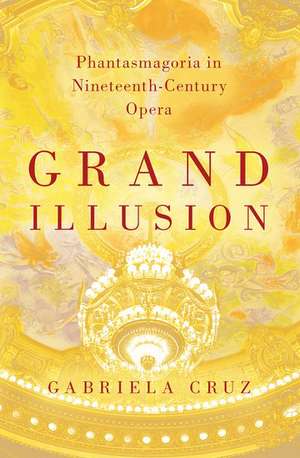Grand Illusion: Phantasmagoria in Nineteenth-Century Opera
Autor Gabriela Cruzen Limba Engleză Hardback – 6 oct 2020
Preț: 535.35 lei
Preț vechi: 613.42 lei
-13% Nou
Puncte Express: 803
Preț estimativ în valută:
102.44€ • 107.17$ • 85.10£
102.44€ • 107.17$ • 85.10£
Carte disponibilă
Livrare economică 01-07 martie
Preluare comenzi: 021 569.72.76
Specificații
ISBN-13: 9780190915056
ISBN-10: 0190915056
Pagini: 312
Ilustrații: 14 illustrations; 39 music examples
Dimensiuni: 239 x 155 x 28 mm
Greutate: 0.59 kg
Editura: Oxford University Press
Colecția OUP USA
Locul publicării:New York, United States
ISBN-10: 0190915056
Pagini: 312
Ilustrații: 14 illustrations; 39 music examples
Dimensiuni: 239 x 155 x 28 mm
Greutate: 0.59 kg
Editura: Oxford University Press
Colecția OUP USA
Locul publicării:New York, United States
Recenzii
Grand Illusion provides a fresh, comprehensive examination of the too-often overlooked visual aspect of grand opera, offering a microscopically detailed analysis of the development of the genre as an expanded form of phantasmagoria.
Cruz provides an extraordinary in-depth treatment of a singular aspect of opera.
Boldly bringing together the history of opera and technology, Cruz demonstrates that gaslight did not merely facilitate operatic production but actually contributed to the musical and theatrical reconception of opera itself. History, in the spirit of phantasmagoria, is often a matter of conjuring some of the forgotten ghosts of the past.
By exploring the emergence of a new phantasmagorical sensibility in French opera in the 1820s, and tracking its influence through the century, Gabriela Cruz offers a rethinking of grand opera as a cultural force that transcends the usual historiographical and national boundaries. Cruz puts Meyerbeer in conversation with Wagner and with Verdi, and demonstrates how a new theatrical visuality transformed the experience of opera in the nineteenth century. This is an exciting and beautifully written study that invites us to celebrate grand opera's transforming power.
A technology that was already malleable to infinite metaphorical transformations, phantasmagoria traverses this book in the way of a prismatic device, allowing the reader to see and hear the unseen and unheard, and to keep a steady focus on the intersecting multiplicity of influences and reactions, of illusions and disillusions. The author canvasses with unparalleled proficiency the voices of journalists and philosophers, of inventors and composers. The result is a phantasmagoria itself: a rich account that alternates revelatory appearances and ghostly presences on a stage that expands from the theatres to the cities of the European nineteenth century.
Cruz provides an extraordinary in-depth treatment of a singular aspect of opera.
Boldly bringing together the history of opera and technology, Cruz demonstrates that gaslight did not merely facilitate operatic production but actually contributed to the musical and theatrical reconception of opera itself. History, in the spirit of phantasmagoria, is often a matter of conjuring some of the forgotten ghosts of the past.
By exploring the emergence of a new phantasmagorical sensibility in French opera in the 1820s, and tracking its influence through the century, Gabriela Cruz offers a rethinking of grand opera as a cultural force that transcends the usual historiographical and national boundaries. Cruz puts Meyerbeer in conversation with Wagner and with Verdi, and demonstrates how a new theatrical visuality transformed the experience of opera in the nineteenth century. This is an exciting and beautifully written study that invites us to celebrate grand opera's transforming power.
A technology that was already malleable to infinite metaphorical transformations, phantasmagoria traverses this book in the way of a prismatic device, allowing the reader to see and hear the unseen and unheard, and to keep a steady focus on the intersecting multiplicity of influences and reactions, of illusions and disillusions. The author canvasses with unparalleled proficiency the voices of journalists and philosophers, of inventors and composers. The result is a phantasmagoria itself: a rich account that alternates revelatory appearances and ghostly presences on a stage that expands from the theatres to the cities of the European nineteenth century.
Notă biografică
Gabriela Cruz is a musicologist specializing in opera and musical theater in the nineteenth and early twentieth centuries. She teaches courses on nineteenth-century music, opera, and the music of the Iberian peninsula at the University of Michigan.
